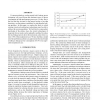61 search results - page 1 / 13 » On the Limits of Leakage Power Reduction in Caches |
HPCA
2005
IEEE
14 years 11 months ago
2005
IEEE
If current technology scaling trends hold, leakage power dissipation will soon become the dominant source of power consumption in high performance processors. Caches, due to the f...
ISLPED
2006
ACM
14 years 4 months ago
2006
ACM
In a few technology generations, limitations of fabrication processes will make accurate design time power estimates a daunting challenge. Static leakage current which comprises a...
ISVLSI
2008
IEEE
14 years 5 months ago
2008
IEEE
The share of leakage in cache power consumption increases with technology scaling. Choosing a higher threshold voltage (Vth) and/or gate-oxide thickness (Tox) for cache transistor...
MICRO
2002
IEEE
13 years 10 months ago
2002
IEEE
On-chip caches represent a sizeable fraction of the total power consumption of microprocessors. Although large caches can significantly improve performance, they have the potentia...
ISQED
2008
IEEE
14 years 5 months ago
2008
IEEE
SRAM leakage power dominates the total power of low duty-cycle applications, e.g., sensor nodes. Accordingly, leakage power reduction during data-retention in SRAM standby is ofte...

